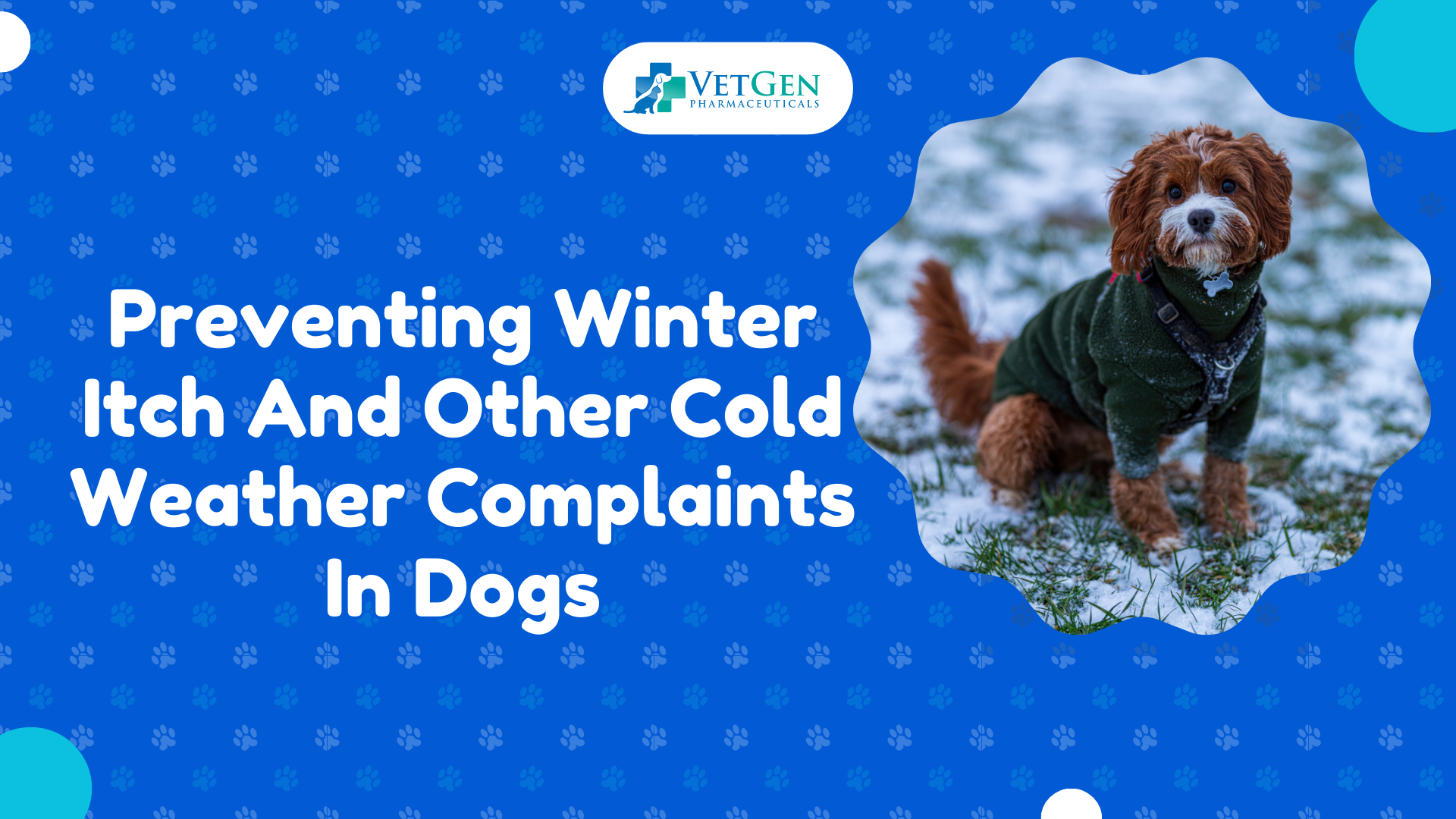Just like people suffer from dry, itchy skin during the winter months, dogs can also experience skin complaints during cold weather – and that shouldn’t come as a surprise.
After all, though dogs may sport a thick coat over their skin, they’re contend with the same cold winter winds and dry indoor heating that we do.
As a result, they end up with dry, flaking skin, eczema flairs, and cracked and painful paws.
Their coats are also more likely to mat and tangle during winter weather.
So, as your dog’s best friend, what can you do to help?
When you have dry skin, one of the first things you do is slather on the moisturizer.
You might also install a humidifier in your home or take other mitigating steps.
You can do similar things for your dog.
In particular, using a dog skin and coat supplement along with other preventative measures can help minimize your dog’s discomfort when the mercury drops.
See The Signs
Before treating your dog for any kind of winter skin complaint, you’ll want to evaluate their general skin and coat health.
Typically, skin issues in dogs manifest as dry, flaky areas that look like dandruff, a greasy coat, or excessive itching.
Your dog may also rub up against furniture, bite at their skin, and even suffer from hair loss.
Seasonal irritations and allergies like winter itch are typically less severe than skin infections like ringworm or bacterial dermatitis, but constant scratching can quickly lead to an infection.
If your dog has any scabs, areas of intense redness, or their skin or coat has a foul smell, they may have a skin infection and should see their veterinarian for proper treatment.
Supplementing For Health
Once you’ve performed a basic skin check, it’s time to figure out how you can help your pet feel more comfortable, and one of the best ways to manage your pet’s skin issues is by using a dog supplement for skin.
But what kind? It’s all about the ingredients.
When choosing a supplement for your dog’s skin, look for products like our Maximum Skin & Coat supplement that contain ingredients like zinc, omega-3 and omega-6 fatty acids from sources like fish or flax seed, and biotin.
Do these ingredients sound familiar?
If so, it could be because many supplements for human hair and skin health contain the same ingredients.
Just as biotin makes your hair shiny and strong, it can make your dog’s coat more lustrous, while also reducing hair loss and symptoms of dermatitis.
Meanwhile, supplementing with zinc can reduce itching and flaking.
Spotlight On Fatty Acids
Fatty acids are among the most popular pet supplements, and with good reason.
Many vets supplement for it year-round to prevent dandruff and dry skin.
The supplement can also act as an anti-inflammatory, which makes it a good choice for pets that have allergies or arthritis, and it’s good for digestive health, especially constipation.
It’s no surprise that fatty acids, especially fish oil products, are among the most popular dog supplements for skin complaints and other health issues.
Using a dog skin and coat supplement can help you manage your pet’s winter skin issues, but it’s not enough on its own.
If you don’t support your pet’s health in other ways, they’re still going to be at risk of serious skin and coat issues.
One of the most important things you should be doing to keep your dog’s skin and coat healthy during the winter is maintaining a regular grooming routine.
Some dogs have winter environmental allergies, so bathing them will help wash away those irritants, while other dogs benefit from a moisturizing shampoo.
Regular brushing will also help get rid of dead skin that might otherwise become irritated and itchy before flaking off.
When bathing your dog during the winter, be sure they’re thoroughly dried before going outdoors.
Thick coats can trap water and make your dog colder rather than warmer.
You’ll also want to brush your dog after bathing to stimulate the skin’s oil glands, for natural moisturizing.
Other Winter Skin Remedies
If your dog regularly walks on icy, salted ground, you’ll want to pay extra attention to his paws during the winter.
Your dog’s paw pads are already vulnerable during winter weather – they can dry out and crack – but salt can be corrosive.
Trim any hair between your dog’s paw pads so that they don’t cake with snow and salt and dry their feet any time they come inside.
Some owners put little boots on their dogs, but this isn’t necessary.
Just keep the salt off and rub some coconut oil or another natural pet-friendly moisturizer on their paw pads if they appear cracked.
Don’t Forget The Basics
Using a dog skin and coat supplement can significantly benefit your dog’s skin and coat, but don’t forget to cover the basics.
Does your dog have enough water? We’re all vigilant about water intake during the summer months, but it’s just as important during the winter – and without it your dog’s skin dryness will be that much worse.
In a similar vein, you’ll both benefit from running a humidifier indoors to mitigate the drying effects of the heat.
Your dog is better able to tolerate cold weather than you may think.
Though they’ve been domesticated, most dogs can tolerate as long as 20 minutes outside in below freezing temperatures as long as they’re active.
Just watch for shivering or whining and make sure they’re not actively looking to go inside.
Most dogs would rather be chilly than cooped up in the house all day.
The Best Winter Yet
Our pets are part of our families, so give your dog the best winter yet by giving our Maximum Skin & Coat Supplement for their comfort.
Just be sure to consult with your vet first – they can help you properly dose any supplement for your dog’s size and breed and ensure there aren’t any underlying issues that need treatment.
By proactively caring for your dog’s skin and coat, you can help them avoid irritation and infection all winter long, whether they’re romping in the snow or curled up by the fire.






